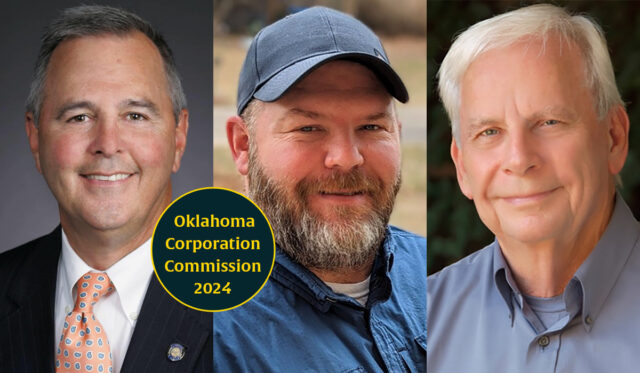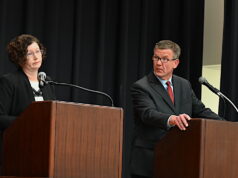
For the first time in 36 years, Bob Anthony will not be on the Oklahoma Corporation Commission next year.
Voters in the Nov. 5 general election will choose among three candidates seeking to succeed Anthony, the longest-serving utility commissioner in the United States and the longest-serving statewide-elected official in Oklahoma. First elected to the OCC in 1988, Anthony cannot seek reelection because of term limits. In 2010, Oklahoma voters overwhelmingly approved State Question 747 that imposed eight-year lifetime term limits on statewide elected officials and subjected corporation commissioners to a 12-year lifetime limit. Anthony, 76, is the last person in office at the time of SQ 747’s passage to hit his term limit.
Those vying for the post are Brian Bingman, a Republican, Harold Spradling, a Democrat and Chad Williams, a Libertarian. Bingman beat two challengers in the June 18 GOP primary, while Spradling and Williams didn’t have a primary election opponent.
The winner will be elected to a six-year term on the Corporation Commission, which is charged with balancing the rights and interests of Oklahoma residents and industries. It regulates a wide range of activities in four core program areas:
- oil and gas drilling and production;
- public utility and telecommunications;
- motor carrier, rail, underground natural gas storage and pipeline transportation; and
- petroleum storage tanks.
The other two commissioners on the three-member panel are Kim David, the OCC’s chairwoman, and Todd Hiett, who is being investigated for allegations of habitual drunkenness and sexual assault.
The only statewide position on the ballot this year, the race for the Corporation Commission seat has been mostly quiet.
Bingman, of Sapulpa, is a former legislator and is running a traditional campaign of raising contributions and spending it on campaign materials and advertising. Spradling and Williams have low-key campaigns: Neither appears to have a campaign website nor campaign social media page. Running for the Corporation Commission for the fourth cycle in a row, Spradling is not asking for campaign donations.
Bingman has large campaign fundraising lead
Bingman, 70, has raised nearly $450,000 in campaign contributions, according to his report filed Aug. 14 with the Oklahoma Ethics Commission. He has spent about $443,000, leaving him a balance of $6,789.
Meanwhile, Spradling and Williams have raised nothing close to that amount. Williams has spent all of the $1,127 he has raised, $1,000 of which came from the Libertarian Party of Oklahoma. Spradling has raised no money. He said he was given a $500 check, which was the result of a donor giving an amount to all the Democratic candidates on next month’s ballot. Spradling said he will return the check.
Bingman, elected in 2004 to the House of Representatives and two years later to the State Senate where he served the last five years in office as president pro tempore, is unapologetic about raising funds to get elected. Before running for the Legislature, Bingman was elected in 1994 to Sapulpa’s city commission. Commissioners two years later selected him mayor, a post he held until winning the House seat.
“Campaign contributions are part of the process,” he said. “If you want to get elected to a statewide office, it takes a lot of resources to get there and your media market and, you know, campaign material, you know, there’s a big cost factor to that. And I think people that invest in my campaign, they’ve seen how I operate so, you know, they’re choosing to invest in me and respect the decisions that I make and, you know, they’re not always going to get their way.”
Bingman has managed properties for oil and gas companies in Tulsa and is well known in the energy field, employees of which have donated to his campaign.
“I’ll abide by the rules, and they understand that once I’m elected, I’m not obligated to anybody,” Bingman said. “I’m there to make decisions, again, based upon the merits of cases, and that’s how it goes.”
This is Bingman’s second attempt to seek a seat on the Corporation Commission. He lost in the 2018 GOP runoff to Anthony. Gov. Kevin Stitt appointed him as secretary of state in October 2020, but he resigned from the post in September 2023 when he announced his candidacy for corporation commissioner. He has a campaign website and campaign Facebook page.
This is the fourth time Spradling, 90, is seeking a seat on the Oklahoma Corporation Commission. As a Republican, he finished third behind Bingman and Anthony in the 2018 GOP primary. In 2020, he lost in the GOP primary to Hiett, and he finished last among four challengers in the GOP primary in 2022 when David won her seat on the OCC.
Now running as a Democrat, Spradling said he did not raise or spend much money on his prior campaigns either. In the 2020 race against Hiett, Spradling said that Hiett “spent about $300,000 for TV ads.”
“I spent nothing, but I got a little over 90,000 votes,” Spradling said.
He said he did buy campaign signs and materials in 1994 when he ran as a Democrat for a state House seat in northern Oklahoma, losing to Republican incumbent Rep. Jim Reese. Spradling said he got about 25 percent of the vote, which was about the makeup of Democrats in that House district at the time.
“So, it wouldn’t have made a difference,” he said.
Spradling, who lives in Oklahoma City and is the father of outspoken attorney Cameron Spradling, said he is an ordained minister and has worked as a school counselor. He also worked 14 years as director of a residential treatment program for the Cheyenne and Arapaho Tribes. He also worked for a construction company and was a land man for an oil and gas company covering 26 counties in the 1980s. He one worked in a railroad office in Springfield, Missouri.
Spradling’s only online presence is a website that has not been updated in four years, although it describes him as a “moderate” both in terms of politics and faith.
“My ancestry includes many preachers. I have attended two church related Bible colleges (one beginning at age 16),” Spradling’s bio states. “In my early days I was referred to as ‘a holy-roller’ and in my later years have been criticized as too liberal because I worship in liturgical churches as well as the evangelical mega churches.”
Williams, 43, said he also is not on social media or the internet much. A Choctaw resident who has worked in the oil fields, Williams is president of Automated Home Solutions, which offers home inspections and residential technology services. Williams is seeking statewide office for the first time. He won election in 2019 to the Choctaw City Council and served one four-year term.
Williams said most of his campaign consists of going door-to-door to talk to voters and speaking at groups. Accepting contributions from companies and utilities regulated by the OCC is “kind of a double-edged sword,” he said.
“I’m of the opinion that I understand why they do that, and I’m not wholly against it,” he said. “The companies and the individuals involved in those companies should have the freedom to donate money to whoever they want. You know, that’s where I differ from Mr. Spradling. I understand he’s wholly against, wholly against the donations itself. Like I said, I’m not, I’m not wholly against it. I just point out the fact that, you know, nearly all of them that have their little PACs or, you know, all their corporate hierarchy, have given money to Brian Bingman, and it’s just kind of telling us who the industry thinks should be regulating them.”
If elected, Williams said he would like to improve efficiencies in the Corporation Commission agency and review burdensome requirements on some of the industries the commission regulates.
“We basically are putting all our eggs in one basket, and that’s been to just absolutely protect the oil and gas industry at the cost of everything else in the state,” he said. “I think that’s something that falls squarely on the shoulders of the Corporation Commission.”
Williams said his goal is to modernize the commission and to cut back or “eliminate regulations on industries that are irrelevant, erroneous, or that hinder the free market.”
“It’s meant for a different time and different age of how things used to run, and it’s not how things are run now,” he said. “Take, for instance, our cotton producers in the state. You know, the Corporation Commission regulates the cotton gins, and right now, because of the overregulation we have in the state, cotton producers are selling their cotton to Texas, and we’re losing out not only in the sales tax revenue on that, but, you know, it’s putting our gin operators, you know, out of business because, you know, they’re just driving it across the state over to Amarillo or wherever the other gins are in the Panhandle there.”
Dealing with proposed utility rate increases
Williams said he is concerned about the large rate increases routinely proposed by OG&E and PSO.
In June, OG&E reached an uncontested settlement from its original $332.5 million rate request, which would have raised their customers’ average monthly residential bill by $19.02. The settlement dropped the proposed rate hike from a historic 13.85 percent, or $332.5 million, to $126.6 million. As a result, the proposed average monthly residential bill increase stands at $9.58. Although awaiting final approval, the rate increase went into effect for OG&E customers in June.
On Oct. 3, an OCC administrative law judge recommended approval of a revised $119.5 million rate increase. PSO, which serves nearly 573,000 customers in the Tulsa area and other sections of Oklahoma, originally proposed a $218 million rate increase. After five days of discussion, the settlement agreement dropped the average monthly bill increase from nearly $16 to $12. The Corporation Commission can accept, modify or reject the settlement agreements.
“Of course, you know, they’ll pay their lip service, but when it comes to actually being open to the ratepayers, it’s pretty much, you know, well, we’re just going to keep doing it because that’s what we’ve always done and, you know, it’s never, you know, actually doing their job and protecting the ratepayer,” Williams said.
Spradling said he would like the utilities to be better prepared for severe weather, especially the electric companies when it comes to preventing damage to overhead power lines caused by downed trees and branches. He said he agrees with Anthony that more audits should be done of the utilities when they request rate hikes or fuel adjustments and when they are faced with repairing damage, such as from Winter Storm Uri.
“I would be a person who will pay attention when the utilities are wanting to raise rates,” Spradling said. “What are they going to do with this?”
Bingman said utilities have responsibility to provide reliable service and the OCC must ensure their rates are reasonable to consumers.
“They incur a lot of expense with a lot of storm damage, you know, when those occur, so consumers, you know, they go to the grocery store, you know, they’re increasing in prices and how much that’s affected them over the last four or five years and then on top of that (…) summer heat, you know, if it’s warmer, then air-conditioning costs and all that, so there’s a lot on the bottom line on expenses on the consumer — on families — and that’s tough,” he said. “So, we want to be very, you know, thorough in our reviews and make sure that what the utility asks for is, you know, reasonable, and really our decisions have to be based upon design, whatever evidence is presented to us to make decisions, so the more information we have, then the better decisions that we can make in the process. So there’s a lot of responsibility for a corporation commissioner and, you know, I will definitely take that job very seriously.”
Bingman said he would like to look into improving and updating how the agency conducts it business.
“I think there’s been, you know, a lot of barriers of the commission that people are frustrated,” he said. “They can’t get things done, can’t get things done timely, so hopefully we can, you know, become a little more efficient in outcomes.”
Candidates have differing views on Hiett
If elected, Bingman would be the third former legislator on the commission. In 2005, Hiett became the first Republican speaker of the Oklahoma House in 80 years, leaving office two years later when he could not seek reelection because of legislative term limits. In 2014, he won election to the OCC. His second and final term expires in two years. David served in the State Senate from 2010 to 2022 and served with Bingman in the upper chamber from 2010 to 2016.
When it comes to Hiett, the three candidates seeking to succeed Anthony have different opinions on whether Hiett should step down from the commission after it was revealed he got blackout drunk and groped an energy industry employee at a conference in Minneapolis in June. A pair of Kansas Corporation Commission employees made written reports alleging that an “extensively intoxicated” Hiett repeatedly rubbed the man’s arm and crotch in a group setting. During an OCC meeting in July, Hiett said he has no memory of the incident owing to his struggles with alcohol and that he is pursuing treatment. No police report has been filed in Minnesota, and the man involved in the incident has not made public accusations against Hiett. Commissioners have hired the law firm of Riggs Abney to conduct an independent investigation into Hiett’s behavior and allegations of misconduct.
Williams said Hiett should resign, and if elected he would encourage him to do so.
“That’s the best-case scenario,” Williams said. “Worst-case scenario, I believe the Legislature, it’s incumbent upon them to seek impeachment. This is absolutely beyond reprehensible for what has occurred, especially when it’s dealing with the very companies that you regulate. It’s absolutely unconscionable that it’s happening with an elected official.”
Spradling, referring to his experiences as director of a residential treatment program, questioned whether an outpatient program that Hiett has said he has been going to would be enough to achieve recovery for a serious substance use disorder. Spradling speculated that Hiett may require an inpatient program.
“It’s not the same as just counseling somebody once a week to talk to you about your problem,” he said. “So, I would just say, if I made a demand, (it would be) either resign or go to a 90-day, in-house treatment program.”
Bingman said the topic of Hiett’s issues has not come up much from voters he has talked with on the campaign trail.
“My personal hope is that Commissioner Hiett gets the treatment that he’s asked for and gets himself well and gets in a position where he can, you know, do the job that he’s supposed to do,” Bingman said.





















